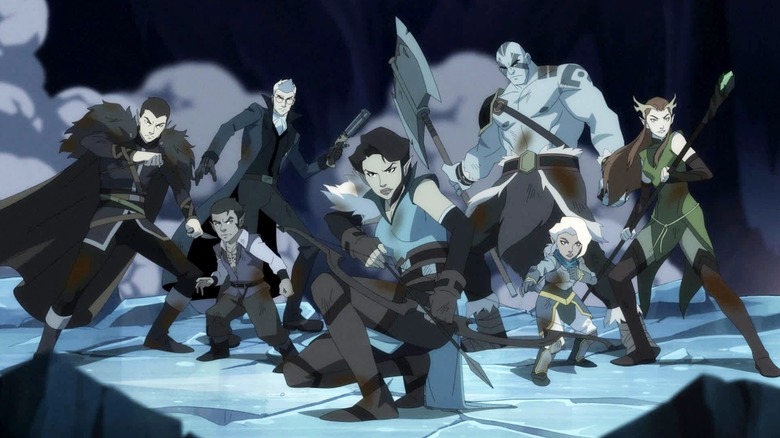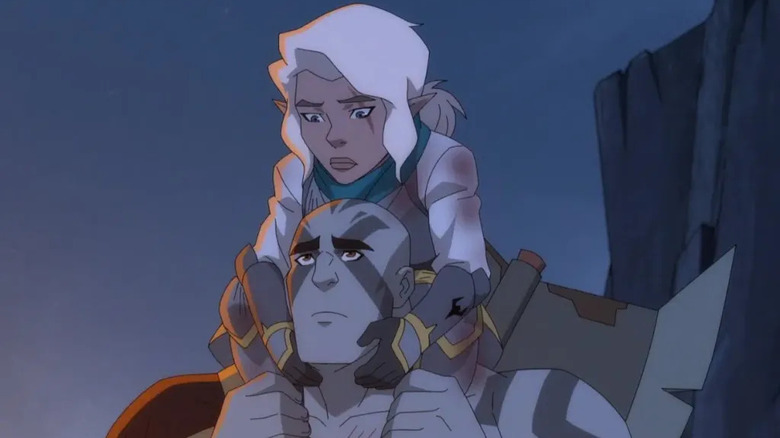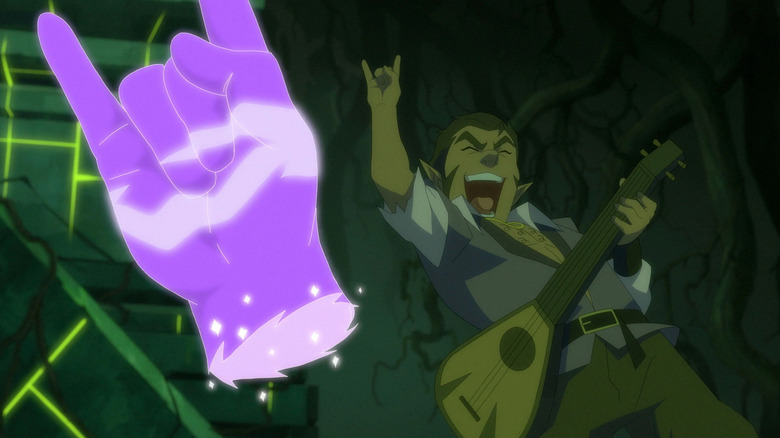The Legend Of Vox Machina Captures The Creative Chaos Of The Best RPG Sessions
When it comes to fantasy shows and movies, you know you can expect epic battles and vast worldbuilding. More often than not, these stories tend to feel a bit too clean and planned out, making sure every part of the story makes sense while sometimes losing a human element to it. Likewise, in the pursuit of epic action, battle scenes tend to focus on flashy characters capable of killing tons of enemies singlehandedly without the need to stop or rest.
That, of course, is not the case with tabletop RPGs. Whether it's "Dungeons & Dragons" or "Pathfinder" or any other game, things seldom go according to plan, and chaos often reigns. Likewise, a player doesn't need to be able to slay three goblins with a single sword stroke to be heroic; sometimes you can be as much of a hero just by providing support. It is here, in the intersection between creative chaos and teamwork, that "The Legend of Vox Machina" shines.
Based on "Critical Role," a popular series of "Dungeons and Dragons" livestream campaigns, the show follows the misadventures of a group of adventurers known as Vox Machina. The show does many things well, from action to humor, but the show stands out among other fantasy adaptations and "D&D" movies and shows by capturing the very human element of tabletop RPG sessions.
You can't kill a dragon without help from friends
Where many fantasy properties focus on making individual characters appear invincible and superpowered, "The Legend of Vox Machina" puts a focus on teamwork and making each character feel essential. Despite the titular Vox Machina being a mismatched group of misfits, it is a team where everyone already has a role. They rely on each other to be strong, they have banter in the middle of a fight, and they help each other out.
The best example of this is in the second episode, where Vox Machina faces off against a dragon, and everyone uses their unique class skills to get the job done. First, Scanlan, the bard, conjures up an illusion of the team fighting amongst themselves as a distraction. Before the dragon can act, Keyleth (a druid) and Percival de Rolo (a gunslinger fighter) stop the dragon in his tracks by shooting some cavern rocks on top of the dragon, and conjuring vines to trap him. While successfully dodging falling rocks like he was rolling on an athletics check, the team's rogue, Vax, gets help from a magic hand conjured by Scanlan, lands on top of the dragon, and proceeds to expose a weak point by slashing his throat open. Not to be left behind, Vax's sister, the ranger Vex, shoots a fateful arrow that is blessed by the team's cleric Pike to provide extra damage. To finish things up, the raging barbarian Grog enters rage and delivers a killing blow to the dragon.
This is a fantastic scene, and just one of many scenes featuring Vox Machina working as a team, which isn't new to the fantasy genre, of course. What makes the show novel, and a great portrayal of RPGs, is the way it doesn't just show the rogue or the barbarian as apt heroes, but proves that each class can contribute in unique ways and also be badasses. Grog, the strongest of the group, often relies on the blessings of Pike, and when she leaves for half the season, her absence impacts how he approaches battles. Likewise, the lack of her healing abilities severely impacts the group's choices in battle. The show makes it a point to showcase the tank/support dynamic which is key to RPGs, and make it clear why it works so well and why it is important. Grog is strong, sure, but he is at his most effective when working together with Pike or Scanlan.
Additionally, "The Legend of Vox Machina" portrays specific mechanics that make its world feel real and grounded in its characters being vulnerable. Everything from concentration being needed to cast spells, to the usefulness of buff spells, to the need for short spells and the danger of running out of spell slots make it so you believe Vox Machina could lose and someone can die at any point. Splitting the party becomes terrifying, because the characters are even more vulnerable. Of course, this is still a fun show with moments of levity, which means these mechanics not only make it harder for the team to succeed without effort, but also open the door for hilarious moments of improvisation that are surprisingly well portrayed in the show.
The dice of fate
Ask anyone who has ever played a tabletop RPG and they'll tell you that 95% of plans are doomed to fail, but also that failure can be just as exciting (if not more) than success. Sure, it's cool when you lay out a plan and it works perfectly, but it can be immensely more satisfying to see a complete failure of a plan give way to an improvised, desperate idea that actually works. The beauty of games like "D&D" is embracing the chaos and coming up with strange solutions to problems, and "The Legend of Vox Machina" definitely understands this.
Capturing improvisation in a scripted medium is tough, but "Vox Machina" finds ways to work around it, with situations that — even with a script — are so ridiculous you cannot help but imagine the behind-the-scenes dice rolling and laughs involved. No scene is better at this than Scanlan's solo adventure in episode 7, aptly titled "Scanboo." In the episode, Scanlan gets separated from the group when he decides to provide a distraction to a group of guards. Rather than run away and save his skin, Scanlan somehow decides to fight back, and the animated show proves not only that Scanlan (and Sam Riegel, who voices him) is awesome, but that bards rule. Adapting episode 31 of "Critical Role," we see Scanlan desperately grab whatever is in his bag that can be used for a fight, and he finds a scroll of polymorph, which he uses to turn into a freaking triceratops.
Fending off against a group of guards and a scary duke, the scene shows not only the power of Scanlan (and Sam Riegel, who plays Scanlan), but even the power of bards to be awesome. Adapting episode 31 of Critical Role, Scanlan grabs whatever is in his bag that can be used for a fight, drinking potions without knowing what they are, and getting incredibly lucky when one of the potions ends up being for fire breathing which he uses to dispose of most guards after having used a polymorph spell to become a triceratops and stampede through the place.
In the original stream, Riegel spends a significant amount of time debating whether he should just use the triceratops to break a hole in a wall and run away, before deciding that being a triceratops is too fun an opportunity to pass up. "The Legend of Vox Machina," even without the meta of seeing the characters say what they're thinking out loud, manages to capture that indecision, as well as Scanlan's "oh well, we'll find out what happens" attitude as he decides to fight back. It is a fantastic example of the kind of chaotic fun that only comes up when playing tabletop RPGs, the kind of desperate plan that cannot be pre-written, with Scanlan succeeding at every point, burping fireballs, and just killing everyone with sheer luck of the dice.
But just like we get moments of incredible serendipity, the dice can also work against you. Indeed, "The Legend of Vox Machina" knows the dice can turn a big enemy into a weak little pebble on the road, but it can also turn something very dumb into the most powerful foe. "Critical Role" fans know that Vox Machina often come into trouble with doors, and the animated show captures this perfectly during a scene where, no matter how much they try, the group simply cannot get a stupid door open — Scanlan literally gets hurt by trying. It's a little moment that otherwise would go unnoticed, but it shows the kind of unpredictability that comes with RPGs, and also with life.
"The Legend of Vox Machina" may not be perfect, but it does more to capture the fun of playing tabletop RPGs than most shows and movies out there. Any show can be "epic," but it takes a truly special show to be utterly chaotic and ridiculous too.


